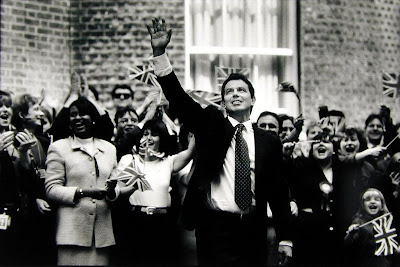Tony Blair: A Journey - First Impressions

I remember quite vividly the day that New Labour won at the 1997 General Election. I had just completed my Year 6 SAT exams that week, and that day I was having a bit of a mini-celebration with some of my friends; lots of fizzy drinks and a taped copy of The Empire Strikes Back (pre-Special Edition) to watch. While we were waiting for the VHS player to rewind the tape (ask your parents kids) the TV was showing a live feed of Tony Blair greeting the masses who had turned out to congratulate the party on their landslide win over the Tories. Being young at the time I had little interest in politics, though I knew that I preferred Tony Blair more than John Major as Blair ‘smiled more’. Yet even I could feel the sense of occasion that accompanied the arrival of New Labour, the feeling of optimism and happiness that seemed apparent on everyone’s face.
This triumphant win dominates much of the first two hundred pages of Tony Blair’s political memoirs, A Journey. Resulting after three years of hard reform of the Labour party, it would prove both a blessing and a curse to the man who went on to become the longest serving Labour Prime Minister. On the one side, it allowed Blair the momentum to forge a lasting peace in Northern Ireland, but it would also prove a high platform from which to fall when the mood of public finally turned against him. As he himself notes:
‘Expectations of this nature cannot be met. That’s what you want to tell people... But the spirit can’t be too constrained. And when it departs... the danger is of disillusion, more painful because of what preceded it.’
Reading these memoirs through the prism of Blair’s later political actions, it is easy to be skeptical of Blair’s prescience. Yet Blair was nothing if not a shrewd reader of public opinion, and as carefully constructed as these opening chapters are to exposing ‘Blair: the human being’ he seems sincere in tone. It helps that much of the prose is quite informal, with the occasional clumsy metaphor and quirky euphemism thrown in for good measure. There is something almost pantomime about his description of lying to the various Irish political parties as ‘creativity pouring out of every orifice’.
The book progresses through a loosely chronological account of Blair’s history with the Labour party, and so some time is spent establishing what condition the Labour party was in throughout the eighties and nineties, and his reasons for running for leader in 1992. Naturally this deals with Gordon Brown in some detail, and while Blair stops short of confirming a definitive deal, he admits that there was an ‘understanding’ that Blair would lead for two full terms and then stand aside for Gordon Brown. While having nothing but praise for Brown’s wit and analytical skills, he criticises for what he calls Brown’s ‘zero emotional intelligence’. Claims that it was Blair who originally suggested independence for the Bank of England are also sure to rile the Brown camp. What amuses are the descriptions of their working relationship that are sure to have more immature readers (namely, myself) giggling at more literal interpretations of the prose:
‘Our minds moved fast and at that point in sync. When others were present, we felt the pace and power diminish, until, a bit like lovers desperate to get to love-making but disturbed by old friend dropping round, we would try to bustle them out, steering them doorwards with a hearty slap on the back’.
I mean, it’s straight out of Mills and Boon, isn’t it?
Other chapters deal in detail with the creation of New Labour, and the handling of Blair’s first real test in power, the death of Princess Diana on August 30th, 1997. Diana’s death in particular proved to be one of the key events in shaping the public’s perception of Tony Blair as a master of the media, and while little is revealed that hasn’t been discussed in countless accounts of Diana’s life over the past thirteen years he does muse on his unease about Dodi Fayed.
Having only reached a quarter way through the book there are huge issues still to be touched upon (9/11, the subsequent invasions of Afghanistan and Iraq, an analysis of his Government’s failings regarding economic policy) but already A Journey is proving to be indispensable reading for anyone with an interest in British politics. Already a picture is being created of Blair as a man who craves popularity, yet is unafraid to go against it in the pursuit of his own convictions. It will be fascinating to see how this perspective changes as the honeymoon period fades away.


Comments
Post a Comment